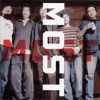Most, "Most Most"
P-Vine
 Genre names obviously come to stand for different things over time,usually by becoming broader and broader as they go. What happens,though, when they start to encompass sounds that are pretty muchantithetical to their own roots? It's hard to know what to make of Mostfor exactly that reason: this bunch of 40-something musicians is waytoo good at playing its instruments to really carry the amateur charmof old punk rock, but it can also belt out throat-shredding bulldozersongs like "Shikaku" (from their self-titled first album) on a moment'snotice. Curiously, now that they're specifically identifying theirmusic as "punk," key and tempo changes and other conspicuous signs ofcapable musicianship have started creeping into the works, and thereare even a couple of choruses on Most Mostthat could have been lifted from a Blondie album. (Now that I thinkabout it, that probably says something about how Most fits under thepunk umbrella, too.) The results of my distracted first listening keeptelling me to say that Most Most is a mellower affair than itspredecessor, but it really isn't: it just isn't compressed to hell andmastered at the same ear-splitting levels. Phew manages to rip it upfar better than she ever did as a star of the '70s Japanese punk scene;twenty-five years on, she's given up the dorky beret while keeping thehowling just enough under control that she doesn't sound like an agingmember of some therapeutic drum circle. She's far deadlier and morefocused than Debbie Harry now, and while she'll never exude death likePatti Smith always has, Most have become more than just impressive...they're almost inspiring now.
Genre names obviously come to stand for different things over time,usually by becoming broader and broader as they go. What happens,though, when they start to encompass sounds that are pretty muchantithetical to their own roots? It's hard to know what to make of Mostfor exactly that reason: this bunch of 40-something musicians is waytoo good at playing its instruments to really carry the amateur charmof old punk rock, but it can also belt out throat-shredding bulldozersongs like "Shikaku" (from their self-titled first album) on a moment'snotice. Curiously, now that they're specifically identifying theirmusic as "punk," key and tempo changes and other conspicuous signs ofcapable musicianship have started creeping into the works, and thereare even a couple of choruses on Most Mostthat could have been lifted from a Blondie album. (Now that I thinkabout it, that probably says something about how Most fits under thepunk umbrella, too.) The results of my distracted first listening keeptelling me to say that Most Most is a mellower affair than itspredecessor, but it really isn't: it just isn't compressed to hell andmastered at the same ear-splitting levels. Phew manages to rip it upfar better than she ever did as a star of the '70s Japanese punk scene;twenty-five years on, she's given up the dorky beret while keeping thehowling just enough under control that she doesn't sound like an agingmember of some therapeutic drum circle. She's far deadlier and morefocused than Debbie Harry now, and while she'll never exude death likePatti Smith always has, Most have become more than just impressive...they're almost inspiring now.
 Genre names obviously come to stand for different things over time,usually by becoming broader and broader as they go. What happens,though, when they start to encompass sounds that are pretty muchantithetical to their own roots? It's hard to know what to make of Mostfor exactly that reason: this bunch of 40-something musicians is waytoo good at playing its instruments to really carry the amateur charmof old punk rock, but it can also belt out throat-shredding bulldozersongs like "Shikaku" (from their self-titled first album) on a moment'snotice. Curiously, now that they're specifically identifying theirmusic as "punk," key and tempo changes and other conspicuous signs ofcapable musicianship have started creeping into the works, and thereare even a couple of choruses on Most Mostthat could have been lifted from a Blondie album. (Now that I thinkabout it, that probably says something about how Most fits under thepunk umbrella, too.) The results of my distracted first listening keeptelling me to say that Most Most is a mellower affair than itspredecessor, but it really isn't: it just isn't compressed to hell andmastered at the same ear-splitting levels. Phew manages to rip it upfar better than she ever did as a star of the '70s Japanese punk scene;twenty-five years on, she's given up the dorky beret while keeping thehowling just enough under control that she doesn't sound like an agingmember of some therapeutic drum circle. She's far deadlier and morefocused than Debbie Harry now, and while she'll never exude death likePatti Smith always has, Most have become more than just impressive...they're almost inspiring now.
Genre names obviously come to stand for different things over time,usually by becoming broader and broader as they go. What happens,though, when they start to encompass sounds that are pretty muchantithetical to their own roots? It's hard to know what to make of Mostfor exactly that reason: this bunch of 40-something musicians is waytoo good at playing its instruments to really carry the amateur charmof old punk rock, but it can also belt out throat-shredding bulldozersongs like "Shikaku" (from their self-titled first album) on a moment'snotice. Curiously, now that they're specifically identifying theirmusic as "punk," key and tempo changes and other conspicuous signs ofcapable musicianship have started creeping into the works, and thereare even a couple of choruses on Most Mostthat could have been lifted from a Blondie album. (Now that I thinkabout it, that probably says something about how Most fits under thepunk umbrella, too.) The results of my distracted first listening keeptelling me to say that Most Most is a mellower affair than itspredecessor, but it really isn't: it just isn't compressed to hell andmastered at the same ear-splitting levels. Phew manages to rip it upfar better than she ever did as a star of the '70s Japanese punk scene;twenty-five years on, she's given up the dorky beret while keeping thehowling just enough under control that she doesn't sound like an agingmember of some therapeutic drum circle. She's far deadlier and morefocused than Debbie Harry now, and while she'll never exude death likePatti Smith always has, Most have become more than just impressive...they're almost inspiring now.



